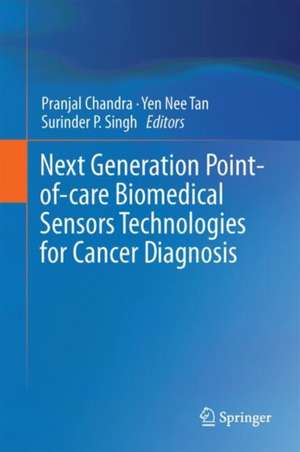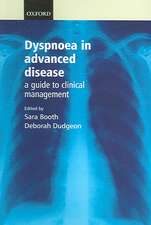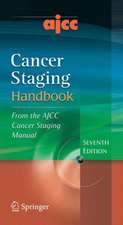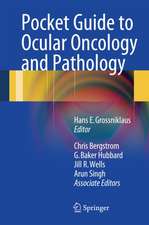Next Generation Point-of-care Biomedical Sensors Technologies for Cancer Diagnosis
Editat de Pranjal Chandra, Yen Nee Tan, Surinder P. Singhen Limba Engleză Hardback – 22 ian 2018
Several methods for diagnosing cancer have been discovered and many more are currently being developed. Conventional clinical approaches to detecting cancers are based on a biopsy followed by histopathology, or on the use of biomarkers (protein levels or nucleic acid content). Biopsy is the most widely used technique; however, it is an invasive technique and is not always applicable. Furthermore, biomarker-based detection cannot be relied on when the biomarkers are present in an extremely low concentration in the body fluids and in malignant tissues.
Thus, in recent years highly sensitive and robust new cancer diagnosis techniques have been developed for clinical application, and may offer an alternative strategy for cancer diagnosis. As such, this book gathers the latest point-of-care cancer diagnostic methods and protocols based on biomedical sensors, microfluidics, and integrated systems engineering. It also discusses recent developments and diagnostics tests that can be conducted outside the laboratory in remote areas. These technologies include electrochemical sensors, paper-based microfluidics, and other kit-based diagnostic methods that can be adapted to bring cancer detection and diagnostics to more remote settings around the globe.
Overall, the book provides students, researchers, and clinicians alike a comprehensive overview of interdisciplinary approaches to cancer diagnosis.
| Toate formatele și edițiile | Preț | Express |
|---|---|---|
| Paperback (1) | 991.12 lei 38-44 zile | |
| Springer Nature Singapore – 13 dec 2018 | 991.12 lei 38-44 zile | |
| Hardback (1) | 1109.80 lei 3-5 săpt. | |
| Springer Nature Singapore – 22 ian 2018 | 1109.80 lei 3-5 săpt. |
Preț: 1109.80 lei
Preț vechi: 1168.21 lei
-5% Nou
Puncte Express: 1665
Preț estimativ în valută:
212.35€ • 222.32$ • 175.71£
212.35€ • 222.32$ • 175.71£
Carte disponibilă
Livrare economică 15-29 martie
Preluare comenzi: 021 569.72.76
Specificații
ISBN-13: 9789811047251
ISBN-10: 9811047251
Pagini: 460
Ilustrații: XII, 396 p. 164 illus., 149 illus. in color.
Dimensiuni: 155 x 235 mm
Greutate: 0.8 kg
Ediția:1st ed. 2017
Editura: Springer Nature Singapore
Colecția Springer
Locul publicării:Singapore, Singapore
ISBN-10: 9811047251
Pagini: 460
Ilustrații: XII, 396 p. 164 illus., 149 illus. in color.
Dimensiuni: 155 x 235 mm
Greutate: 0.8 kg
Ediția:1st ed. 2017
Editura: Springer Nature Singapore
Colecția Springer
Locul publicării:Singapore, Singapore
Cuprins
Cancer Biomarkers: Important Tools for Cancer Diagnosis and Prognosis.- Transcription factors as detection and diagnostic biomarkers in cancer.- Cancer biomarkers immunosensing strategies based on graphene surface engineered materials.- Label-free biosensors for early diagnosis of cancer based on G-quadruplex and isothermal amplification.- Point-of-care and implantable biosensors in cancer research and diagnosis.- Electrochemical Redox Cycling Amplification Technology for Point-of-Care Cancer Diagnosis.- Hyperbolic metamaterials-based ultra-sensitive plasmonic biosensors for early stage cancer detection.- SERS-based biosensors as potential next generation point-of-care cancer diagnostic platforms.- Nucleic acid-based aptasensors for cancer diagnostics - An insight into immobilisation strategies.- Nanobiosensing technologies for prostate cancer diagnostics/prognostics: Tiny smart medicine.- Developments in the Electrochemical Bionanosensors for the Predictive Diagnosis of Prostate andBreast Cancer.- Oligopeptides for Cancer and other Biomedical Sensing Applications.- Microfluidic immunoassay devices as next generation cancer and medical diagnostics platform.- Point-of-care device with plasmonic gold nanoarray sensing chip for biomarker detections.- Sers Biosensing and Bioimaging: Design and Applications in Cancer Diagnostics.- Microfluidic Paper-based Analytical Devices for Point-of-Care Diagnosis.
Notă biografică
Dr. Pranjal Chandra is currently employed as Assistant Professor and principal investigator at Department of Biosciences and Bioengineering, Indian Institute of Technology Guwahati, Assam, India. He earned his Ph.D. from Pusan National University, South Korea and did post-doctoral training at Technion-Israel Institute of Technology, Israel. He has published over 50 research articles in reputed journals and 1 book (IET, London). He is also a visiting scientist at IBST, South Korea. Pranjal's research contributions are highly interdisciplinary, spanning a wide range in nanobiotechnology, nanobiosensors, lab-on-chip systems for biomedical diagnostics, and nanomedicine. His work has been highlighted in the World news of Royal Society of Chemistry, Cambridge as "A new system for cancer detection” and also featured as a key scientific article in the Global Medical Discovery news Canada. He is recipient of many prestigious awards and fellowships such as; Ramanujan fellowship (Government of India), BK -21 and NRF fellowship of South Korea, Technion post-doctoral fellowship, Israel, University of Montreal Post-doc fellowship, Canada, NMS Young scientist Award (2016) etc. He is also editorial board member of a dozen international journals including; World journal of methodology, USA; Frontiers of Biosciences, USA; Journal of Biosensors and Bioelectronics, USA etc.
Dr. Yen Nee Tan is the Principle Investigator and Program Manager of the Biomimetic and Biomedical Materials at the Institute of Materials Research and Engineering, under the Agency of Science, Technology and Research (A*STAR), Singapore. She is also the Adjunct Assistant Professor of Chemistry at the National University of Singapore. Her research focuses on the design of biogenic smart materials inspired by Nature and development of ultrasensitive technologies for biomedical diagnostics, food sensing and environmental monitoring. She holds 10 patents and 2 licenses on nanobiosensors.She is an editorial board member and guest editor of several scientific journals, such as Austin Journal of Biosensors and Bioelectronics, USA. Dr Tan is the recipient of more than 10 scientific awards, including the Young Giants of NanoScience Early Career Award 2016 (Hong Kong), Best Presenter Award at Asian Conference on Chemical Sensors 2015 (Malaysia), Finalist of L’Oreal for Women in Science National Fellowship 2013 (Singapore), Tan Kah Kee Young Inventors’ Award 2012 (Singapore), Biomedical Engineering Society Best Technical Presentation Award 2011 (Singapore), AsiaNANO Young Researcher Award 2010 (Japan), etc.
Dr. Surinder P. Singh obtained his M.Sc. (1992) and Ph.D. (1998) degrees from G.B. Pant University of Agriculture & Tech., Pantnagar, India, in Physics. Currently he is working as a Sr. Scientist at National Physical Laboratory (CSIR), New Delhi, India. He served as Assistant Professor, in Engineering Science and Materials Department at University ofPuerto Rico, Mayaguez, USA (2008–2011). His efforts at CSIR-NPL have initiated a national activity on biomedical instrument standardization. Dr. Singh is the project director of an Indo-US Joint center on nanomedicine for Head and Neck Cancer in collaboration with Northeastern University, and DFCI, Harvard medical school. He has 91 publications in his record. He has attended several national and international conferences and has delivered several invited talks. His research group is working on nanomaterials, optoelectronics, nanomedicine, nanobiointerface, bio-implants, sensors, and biosensors for various biomedical and environmental applications.
Dr. Yen Nee Tan is the Principle Investigator and Program Manager of the Biomimetic and Biomedical Materials at the Institute of Materials Research and Engineering, under the Agency of Science, Technology and Research (A*STAR), Singapore. She is also the Adjunct Assistant Professor of Chemistry at the National University of Singapore. Her research focuses on the design of biogenic smart materials inspired by Nature and development of ultrasensitive technologies for biomedical diagnostics, food sensing and environmental monitoring. She holds 10 patents and 2 licenses on nanobiosensors.She is an editorial board member and guest editor of several scientific journals, such as Austin Journal of Biosensors and Bioelectronics, USA. Dr Tan is the recipient of more than 10 scientific awards, including the Young Giants of NanoScience Early Career Award 2016 (Hong Kong), Best Presenter Award at Asian Conference on Chemical Sensors 2015 (Malaysia), Finalist of L’Oreal for Women in Science National Fellowship 2013 (Singapore), Tan Kah Kee Young Inventors’ Award 2012 (Singapore), Biomedical Engineering Society Best Technical Presentation Award 2011 (Singapore), AsiaNANO Young Researcher Award 2010 (Japan), etc.
Dr. Surinder P. Singh obtained his M.Sc. (1992) and Ph.D. (1998) degrees from G.B. Pant University of Agriculture & Tech., Pantnagar, India, in Physics. Currently he is working as a Sr. Scientist at National Physical Laboratory (CSIR), New Delhi, India. He served as Assistant Professor, in Engineering Science and Materials Department at University ofPuerto Rico, Mayaguez, USA (2008–2011). His efforts at CSIR-NPL have initiated a national activity on biomedical instrument standardization. Dr. Singh is the project director of an Indo-US Joint center on nanomedicine for Head and Neck Cancer in collaboration with Northeastern University, and DFCI, Harvard medical school. He has 91 publications in his record. He has attended several national and international conferences and has delivered several invited talks. His research group is working on nanomaterials, optoelectronics, nanomedicine, nanobiointerface, bio-implants, sensors, and biosensors for various biomedical and environmental applications.
Textul de pe ultima copertă
This book presents recent research on cancer detection methods based on nanobiosensors, which offer ultrasensitive point-of-care diagnosis.
Several methods for diagnosing cancer have been discovered and many more are currently being developed. Conventional clinical approaches to detecting cancers are based on a biopsy followed by histopathology, or on the use of biomarkers (protein levels or nucleic acid content). Biopsy is the most widely used technique; however, it is an invasive technique and is not always applicable. Furthermore, biomarker-based detection cannot be relied on when the biomarkers are present in an extremely low concentration in the body fluids and in malignant tissues.
Thus, in recent years highly sensitive and robust new cancer diagnosis techniques have been developed for clinical application, and may offer an alternative strategy for cancer diagnosis. As such, this book gathers the latest point-of-care cancer diagnostic methods and protocols based on biomedical sensors, microfluidics, and integrated systems engineering. It also discusses recent developments and diagnostics tests that can be conducted outside the laboratory in remote areas. These technologies include electrochemical sensors, paper-based microfluidics, and other kit-based diagnostic methods that can be adapted to bring cancer detection and diagnostics to more remote settings around the globe.
Overall, the book provides students, researchers, and clinicians alike a comprehensive overview of interdisciplinary approaches to cancer diagnosis.
Thus, in recent years highly sensitive and robust new cancer diagnosis techniques have been developed for clinical application, and may offer an alternative strategy for cancer diagnosis. As such, this book gathers the latest point-of-care cancer diagnostic methods and protocols based on biomedical sensors, microfluidics, and integrated systems engineering. It also discusses recent developments and diagnostics tests that can be conducted outside the laboratory in remote areas. These technologies include electrochemical sensors, paper-based microfluidics, and other kit-based diagnostic methods that can be adapted to bring cancer detection and diagnostics to more remote settings around the globe.
Overall, the book provides students, researchers, and clinicians alike a comprehensive overview of interdisciplinary approaches to cancer diagnosis.
Caracteristici
The proposed book discusses the most recent new point-of-care technologies right from sensors, microfluidics, and the commercially viable paper based devices for cancer diagnosis Discussion about translated diagnostic device is expected to provide the readers information about the research having commercial values Minute details on the diagnostic protocols are included in each chapter










